- Home
- David Pilling
Holy Warrior
Holy Warrior Read online
LONGSWORD (III):
HOLY WARRIOR
By David Pilling
Glossary
Aventail – A flexible curtain of mail attached to the skull of a helmet that covers the throat, neck and shoulders
Destrier – The more expensive form of warhorse ridden by Christian knights
Kazaghand – A light coat of armour consisting of mail sewn between layers of cloth
Kettle hat – A type of helmet with a wide brim
Lamellar – Body armour of small rectangular plates (scales or lamellae), laced into horizontal rows
Naker – A small drum of Arabic origin
Rouncy – An ordinary, all-purpose horse ridden by Christian soldiers below the rank of knight
Rumis – Turkish soldiers from the Seljuk sultanate, ruled by the Tartars
Sergeant – a common mounted soldier
Tartars – European term for the combined Mongol-Turkic peoples
1.
1271 AD
A storm threatened to engulf the English fleet. Thirteen ships fought desperately to stay afloat, tossed about by the waves as though Neptune toyed with them. Sometimes a ship vanished, submerged under the roaring waters, only to thrust back to the surface. Their crews, soaked to the skin, bawled at each other, voices all but drowned by the boom of the waves and the pounding of torrential rain. Masses of black cloud swirled overhead. North, on the edge of vision, stabs of lightning lit up the gloom.
The hold of the flagship, the St. George, was crammed with sick men and animals. Horses kicked and shrieked in their pens while knights and men-at-arms sat in huddled rows under the main deck. Some cursed or wept like frightened children. Others prayed for the storm to end. Most sat in silent misery, hunched under cloaks and blankets, moving only to spew into the wooden pails provided.
Many of the pails were full; many, too, were overturned when the ship rocked under the buffet of yet another powerful wave. The deck was awash with vomit, adding another stench to the already foul reek of sweat, piss and terror. A few lanterns swung from hooks in the roof, casting a spectral yellow glow over the scene.
Hugh Longsword sat near the prow, spine braced against the curve of the ship’s timbers. They shuddered and creaked alarmingly, but he cared little. He was barely conscious, kept awake solely by the agony in his guts. His stomach was long since empty, yet still he retched and dry-heaved, brought up drops of stinking bile.
“God, God, God,” murmured the man opposite. “If I forget thee, O Lord, let my right hand forget her cunning. If I do not remember thee, O Jerusalem, let my tongue cleave to the roof of my mouth. Nisi meminero tui, Jerusalem…”
The voice trailed away to a sob. It belonged to Teobaldi Visconti, an Italian priest who had decided to accompany the English expedition to the Holy Land. His thin yellow face, or what could be seen of it under a dark cowl, was more haggard than it usually was. He rocked gently back and forth, eyes screwed shut, hands clasped together in prayer. A thin trail of vomit hung from his lower lip.
Does he regret being with us? Hugh wondered idly. The Lord has not seen fit to spare him the agonies of the journey. None of us are spared. Perhaps we are fated to drown, here, without even seeing the coast of Acre.
He shuddered as another spasm wracked his aching belly. If this is the Lord’s idea of a jest, then he is the worst Fool in existence.
The corners of Hugh’s mouth twitched in a feeble smile. What would Visconti make, he wondered, of such blasphemy? The Italian was as devout as he was ambitious, yet possessed of a gentle humour. He made no secret of his desire to be Pope, once the ancient Clement IV finally gave up the ghost. Unless the storm passed, Visconti was more likely to see the inside of a fish’s belly than the Holy See.
A great crack of thunder exploded overhead, the loudest yet. Men whimpered and clung to each other – trained knights, hard-bitten soldiers of many a tough campaign, reduced to frightened babes. The knight to Hugh’s left clutched his wrist. Hugh lacked the strength or the will to shake him off.
Not everyone was unmanned by the storm. “Don’t fret, lads,” a knight rasped in a thick northern burr. “Neptune has a poor aim.”
Hugh recognised the voice, and the accent – Adam Jesmond, a knight of Northumbria, one of the first knights to volunteer for the Lord Edward’s crusade. He was a relentlessly cheerful character, forever spouting jests and brave speeches. Hugh hated the man and felt guilty for it. After all, Jesmond was only trying to keep up the morale of his comrades.
I would happily strangle him, Hugh thought, and experienced another stab of guilt. What was wrong with him? When had he become so mean, so petty-minded?
The sound of the man’s harsh Northumbrian accent compelled Hugh’s mind to wander along old paths. Back to his adventures in northern England, three years gone. His duel with a hooded assassin in the midnight streets of York, blades clashing in a pool of moonlight; the depths of the black dungeon at Harbottle; Edward’s axe splintering an outlaw’s breastbone in the final battle at Alnwick.
His memories went back further, to Windsor and the tap-tapping of Master John of Saint Michael’s cane on bare flagstones.
“Much better, Longsword. You have shed weight, and move faster. Sancho has drummed some skill into you. I am pleased.”
The memory of the old spymaster’s little eyes, bright and piercing as a hawk’s, still had the power to make Hugh shudder. Master John was fourteen months cold in his grave, carried off by a sickness that slowly devoured him from the inside. Hugh was at the old man’s bedside when he died. He remembered the faint pressure of Master John’s tiny birdlike hand, resting in the palm of Hugh’s own; the painful wheezing of the old man’s breath, growing ever fainter.
Besides a priest, there were three others present at the end – two men and a woman, grown old in the Savoyard’s service. Hugh vaguely recognised their faces, but otherwise knew nothing of them. Most of Master John’s army of spies were strangers to each other; one reason for their success.
Lost in the past, Hugh only dimly heard the screams as the ship suddenly heaved upwards, then plunged back down again. The lanterns swung violently, casting grotesque shadows against the hull. A horse kept on shrieking long after most of the noise had died down. The animal’s high-pitched whinnies of pain were dreadful to hear. A broken leg, most likely. Hugh cupped his hands over his ears and sang to himself, half-remembered snatches of a lullaby from childhood.
“Lullay, lullow, lully lullay…sleep softly now, I saw a sweet and seemly sight, a blissful bird, a blossom bright…lullay, lullow…”
His neighbours caught up the familiar old tune. Their low voices chorused the refrain, even as men wept and puked and prayed for death, the seas and skies roared outside, and the injured horse went on screaming. Mercifully, the tortured cries were abruptly cut off: some practical soul had put the beast out of its misery.
A sharp pain in Hugh’s gut forced him to double over. He scrabbled for his bucket and retched into it. Nothing came up. His body was squeezed dry, yet the pain still clenched his innards. Whimpering, he gritted his teeth and endured it until the pangs died away.
Hugh leaned back against the timbers. He shivered, as though suffering from an ague, and was drenched in sweat from head to toe. After a moment of futile defiance, he started to weep, slow, hot tears, coursing down his cheeks. Shamed, Hugh was too weak to brush them away.
“Courage, Longsword. This is not the end. God merely tests our resolve.”
The voice belonged to the Lord Edward. Hugh glanced to his left, where his master lay in the shadows under a red cloak, his long body propped against a bolster stuffed with wool. Edward was apparently asleep, eyes closed, his long face grey and unshaven, slick with sweat. The prince’s long fair hair clung to his sho
ulders and the nape of his neck in damp folds.
His wife, Eleanor of Castile, clung to her husband, one delicate brown hand laid flat against his chest. To Hugh’s eyes there was something possessive about the gesture, the way she twined herself about him, like a clinging plant. Her features were more striking than beautiful, the nose too long, the mouth a shade too wide.
The couple clearly adored each other; by rights, Eleanor should have stayed with her ladies in the chamber at the stern, the only private space aboard the St. George. Yet she refused to be parted from Edward for a moment longer than necessary. If the vessel sank, they would go down together.
Hugh moistened his lips to speak. “My lord,” he croaked. “If we are to die, I could not wish for better company.”
Crawler, he thought guiltily. Yet it did no harm to plant a few seeds in Edward’s mind. In future – if they had a future – he would remember those who showed courage in times of peril. Or at least pretended to.
The fleet had not long sailed from Cyprus when the storm hit. So close to their goal, after months of weary travelling! Hugh cast his mind back over the long trek through France, North Africa and Sicily. He shivered at the memory of the flies and heat of Tunis, the foul disease that had swept through the Christian host and carried off thousands of men to greet their Maker. Among them was St. Louis, the crusader-king of France.
Poor Louis. All his life he dreamed of restoring the glory of Outremer, the Christian states of the Holy Land. Instead he shat himself to death outside the walls of Tunis, mumbling prayers to the last. His death broke the spirit of many of the Christian princes, who turned for home. All with the exception of Edward. Hugh could still recall the royal voice raised in anger, when it was suggested he should give up the hopeless quest and return to England.
“By God’s blood, though all my fellow soldiers and countrymen desert me, I will go to Acre with my groom Fowin, and keep my word and my oath to the death!”
Hugh’s pride in his master’s courage was mixed with regret. There was no shame in admitting defeat; the English numbered barely a thousand men and could not hope to save Outremer by themselves. Yet Edward insisted on soldiering on. It was a matter of honour and salvation.
Whose honour, Hugh thought bitterly, and whose salvation?
The violent rocking of the boat settled down a little. Sick unto despair, Hugh let himself tumble into the pit. While the storm howled and the thunderous waves threatened to dash the St. George to pieces, he dreamed peacefully of green forests, golden cornfields and the gentle pattering of English rain.
*
He woke to find himself becalmed. The sea-sickness had lifted slightly, and the pain in his gut was quite gone. Hugh looked about him to find the cramped space between decks was empty. All his comrades had gone, save for one miserable knight who was too weak to move. He was left behind to slumber, attended by his pale young squire.
The faint sound of trumpets, bugles and clashing cymbals reached Hugh’s ears, accompanied by voices raised in plainchant. He recognised the melody of Vexilla Regis Prodeunt, an ancient Latin hymn.
“Vexilla regis prodeunt,
“fulget crucis mysterium,
“quo carne carnis conditor
“Suspensus est patibulo”
“The banners of the king issue forth,
“The mystery of the cross does gleam,
“Where the creator of flesh, in the flesh,
“By the cross-bar is hung.”
Feeble as a kitten, Hugh struggled to his feet and stood still for a moment, adjusting to the gentle sway of the ship. He sucked in a few deep breaths and tried to ignore a sudden wave of nausea. When he felt reasonably steady again, Hugh shuffled towards the ladder to the main deck. The deck, he noticed, had been sluiced clean of vomit and filth, doubtless at Edward’s order.
Hugh struggled up the ladder, stopping near the top to take in breath again. The sea-sickness had leeched his strength. He winced at the flood of glaring yellow sunlight that threatened to blind him. It was foully hot, and his skin already prickled with sweat.
The noise grew louder. Hugh heaved himself onto deck and shaded his eyes to look round him. The main deck and forecastle of the St. George was crowded with bodies, sailors, knights and men-at-arms all mixed up together. The tall figure of Prince Edward loomed above the crowd on the forecastle, a head taller than anyone else, his fair hair shining like burnished gold in the sun. He still wore his red cloak, and Eleanor was at his side, head rested on his shoulder, her raven hair a stark contrast to his fair.
Many aboard could hardly stand upright, yet they waved and cheered in hoarse voices, croaking like a pack of hungry ravens. A few of the stronger crewmen hung from the rigging of the mainmast, cheerfully hailing the shore.
“Ahoy there, men of Acre! We’re coming to drink you dry and steal your women!”
The sky above was a brilliant blue, washed clean of storm clouds. Hugh stumbled towards the ladder of the forecastle. He nearly tripped over a rope and grabbed at the mainmast for support. The heat enclosed him like a shroud. Gasping, he staggered over to the side, pushed between two burly sailors and peered straight ahead.
His spirits leaped at the sight of the city of Acre spread out before him, across a glittering stretch of water. A mass of yellow buildings, towers, terraced streets, flat-roofed houses and churches stretched from north to south, almost as far as the naked eye could see. Hugh had some idea of the layout of Acre from studying rough maps, but nothing could prepare him for the reality of this, the great Christian sea-port of Outremer. He looked north to the Venetian Quarter, dominated by a huge rectangular palace; beyond it, walls and towers marching away into the shimmer of a heat haze. The city was surrounded by flat plains, watered and irrigated to provide food for the thousands of inhabitants.
The St. George knifed towards the outer harbour, guarded by a formidable square tower built on an island overlooking the entrance.
Hugh caught his breath. The Tower of Flies, he thought. The guard tower was ancient, named by the first crusaders to arrive in Acre after Ba’al-zebub, Lord of the Flies and one of the seven Princes of Hell. He shivered, in spite of the heat, and draw his robe a little closer about him.
Sunlight glinted from the steel helms of the archers on the battlements. The steel boom that would usually block access to the harbour had been removed, and the voices of the men on the tower echoed across the sea as they cheered the arrival of the English fleet. Hugh could see the tall masts of ships packed inside the harbour, from where the massed roar of thousands of voices, a cacophonous mix of songs, hymns and plainchant, mingled with the wild music of trumpets, pipes, drums and clashing cymbals.
The man to Hugh’s left, a grizzled man-at-arms with a white scar where his left eyebrow ought to be, winked at Hugh. “Seems they’re pleased to see us,” he said, raising his voice above the din.
Hugh smiled weakly back. His head swam. He braced himself against the side of the ship and tried to ignore the pitch and roll of the deck under him. The St. George was gathering speed, propelled by two banks of oars to make up for the lack of wind. Somewhere a pipe began to play, accompanied by the beat of a drum. People started to clap in time, soldiers and crewmen, even a few of the great lords on the forecastle. Hugh saw Eleanor join in, white teeth flashing as she laughed for pure joy. Her husband smiled coolly but kept his hands to himself.
The same joy filled Hugh. It revived him like a tonic before medicine, filled him with new strength, made him giddy. Already lightheaded from sickness and lack of food, he was seized with a kind of euphoria. Others experienced it too. The St. George was filled with laughter, or else men broke down and wept, fell to their knees and offered thanks for their deliverance. Others embraced each other like brothers and linked arms to dance a jig on the main deck; so many prancing scarecrows, ghastly pale from sea-sickness, eyes gleaming feverishly as they laughed and sang and capered like madmen.
Acre. Through the swirl of Hugh’s thoughts, the name shone l
ike a beacon. Acre – Outremer – the Holy Land!
After so many months at sea, all the dangers and storms and setbacks, the long journey of the English crusaders was over. Against all the odds, they had reached their goal.
“DEUS VULT!”
This thin, reedy cry came from the mouth of the Italian priest, Teobaldi Visconti. Somehow he had found the strength to clamber partway up the rigging of the mainmast, and now dangled precariously above the throng like a sick ape. Unshaven and hollow-cheeked, his large eyes burning with fever, he raised one pale hand and made the sign of the cross.
“Deus Vult!” he cried again. “God wills it, my children! Now praise the Almighty and all the saints, for they have brought us through every trial!”
Deus Vult. God wills it. The ancient war-cry of the crusaders rippled down the length of the ship, taken up by scores of voices.
Swept along by the excitement, battered by waves of nausea and euphoria, Hugh threw caution to the winds. He pushed himself away from the side of the ship, flung his arms wide and roared to the heavens
“Deus Vult! Deus Vult! Deus Vult!”
The St. George lurched suddenly. Thrown off-balance, arms windmilling, Hugh lost his footing and tumbled forward. His forehead smacked hard against the deck. He moaned feebly and tumbled into sweet oblivion.
2.
Baibars sat outside his pavilion, hands folded on his stomach, and gazed up at the citadel of Qala'at Sanjil, perched high above the walls of Tripoli.
It was, the sultan mused, possibly the ugliest fortress in the whole of Outremer – a brutally functional series of ramps, terraces and square towers, constructed by Frankish engineers without a shred of beauty in their heads. The castle had stood for almost two centuries, an impregnable symbol of Christian power.

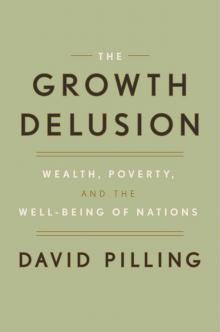 The Growth Delusion
The Growth Delusion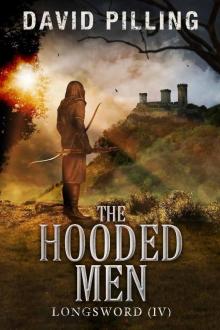 The Hooded Men
The Hooded Men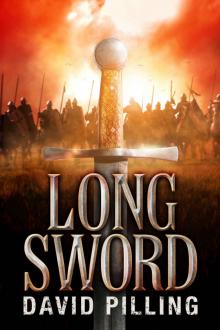 Longsword
Longsword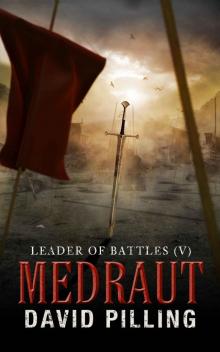 Medraut
Medraut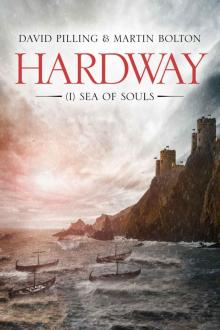 Hardway
Hardway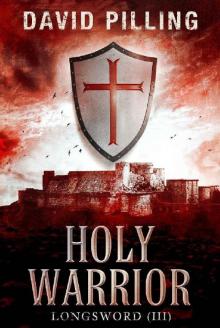 Holy Warrior
Holy Warrior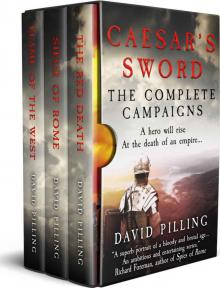 Caesar's Sword: The Complete Campaigns
Caesar's Sword: The Complete Campaigns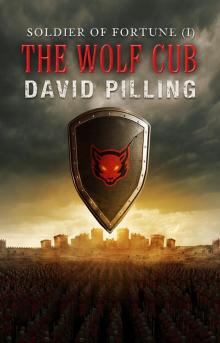 The Wolf Cub
The Wolf Cub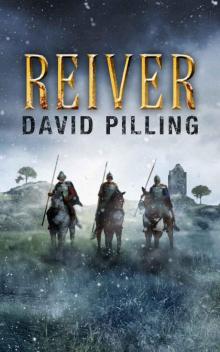 Reiver
Reiver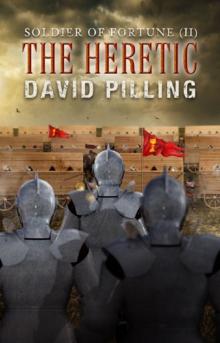 The Heretic
The Heretic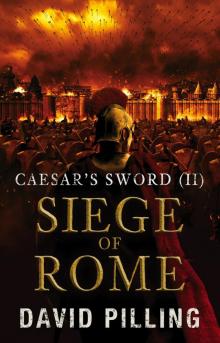 Siege of Rome
Siege of Rome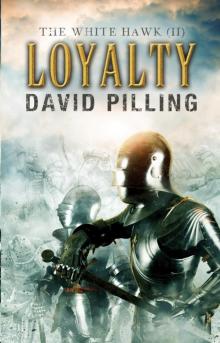 Loyalty
Loyalty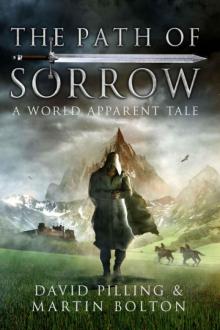 The Path of Sorrow
The Path of Sorrow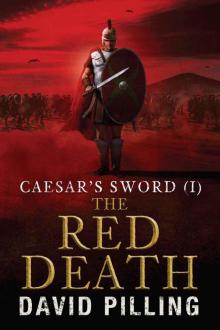 Caesar's Sword (I): The Red Death
Caesar's Sword (I): The Red Death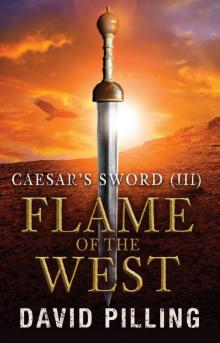 Flame of the West
Flame of the West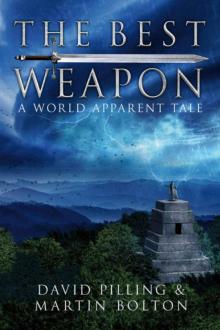 The Best Weapon
The Best Weapon Sacrifice
Sacrifice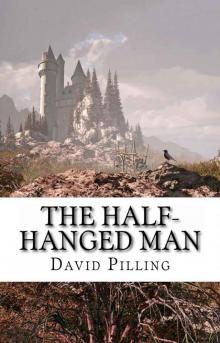 The Half-Hanged Man
The Half-Hanged Man